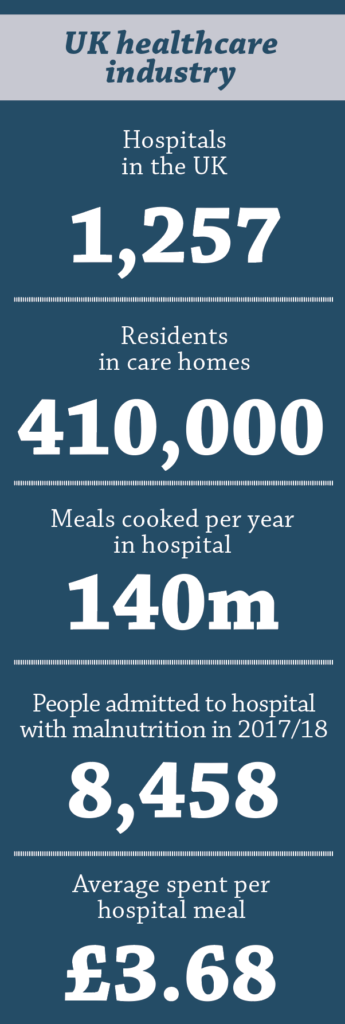Helena Drakakis takes a deep dive into the healthcare sector to understand its opportunities and challenges
Last year, the government pledged to work with the NHS on improving the quality of hospital food to provide consistently safe, nutritious and tasty meals. Yet, with continually squeezed budgets and the threat of increased food prices, wholesalers and suppliers must now perform a tricky balancing act to offer quality and value. Outside of hospitals, the healthcare sector is ever evolving, but for wholesalers that tailor their offer well, there’s a slice of the market to enjoy.
Understand the market
Overall public sector catering, including healthcare, is worth £4.2bn to wholesale. Hospitals, nursing homes, care homes and specialist care facilities all fall under the healthcare umbrella.
More established players, such as wholesaler Brakes, are one of the leading suppliers to the care-home sector. However, smaller operators are focusing on healthcare as a key area for growth this year.
Country Range member Harvest recently invested in a dedicated healthcare team. “Healthcare at Harvest is a small, but rapidly growing sector,” says sales and marketing director Steve Whitwam, adding that last year, the Southampton-based company grew its healthcare turnover by 15%.
Read more: A view to success: Checking into the hotel sector
Offer an experience
 Offering a food experience to all age groups is key, but has particular resonance with older patients and care-home residents.
Offering a food experience to all age groups is key, but has particular resonance with older patients and care-home residents.
According to a 2017 study by Newcastle University, an extra 71,000 care-home spaces will be needed in the next eight years to cope with the UK’s ageing population. “Bringing back food memories of the residents is a very important factor in the experience,” says Whitwam.
Because food stimulates smell, taste and sight, this is particularly significant for residents suffering from dementia.
More care providers are also emerging at the premium end of the market and offering more of a restaurant concept in homes. “This is often separate to the dining area and we are seeing small pubs in care homes, too.” he adds.
According to Sophie Murray, head of nutrition and hydration at advisory organisation Sunrise Senior Living, several factors may influence patients’ and residents’ metabolism, including medication. “Making sure residents eat smaller portions of nutrient-rich food is essential,” she says.
Malnutrition can be a serious problem, particularly among an older generation. To help combat this, Thomas Ridley Foodservice has developed its Key2Nutrients software system, which helps chefs plan meals to ensure each meal has correct nutritional values.
Another useful online feature is an allergen check, where customers can select items that exclude certain allergens.
Other customers may require soft diets, nut-free products or vegan and vegetarian options. “Each account manager will support their customers and offer as much of a customised experience as possible,” says Steve Lyons, Thomas Ridley’s sales director.
Create solutions that matter
While some patients and residents will be able to manage three meals a day, others will need to snack little and often. “For dementia sufferers who have problems holding a knife and fork, finger foods are an ideal way to help residents maintain their independence, dignity and a daily routine,” says Pamela Maclean, Bidfood’s food development manager. It offers a range of food such as mini croissants, mini beef and veggie burgers, fish nuggets and desserts.
Premier Foodservice has led the way in catering for dysphagia sufferers, who have problems swallowing and need softer foods. The supplier was the first to develop and launch an International Dysphagia Diet Standards Guide, which includes recipe ideas and practical tips.
“The condition varies from person to person and some individuals are at a greater risk of malnutrition, dehydration, aspiration pneumonia and choking as a result. Recipes within the guide include a Bisto and Homepride Full English Breakfast, a Sharwood’s and Homepride Vegetable Korma and an Ambrosia Passionfruit Pavlova,” says Premier’s channel marketing manager, Sarah Robb.
Read more: A lot to be learned: Exploring the education sector
Work to a client’s time-scale and budget
“Time and budget constraints are a pressure most struggle with, and providing a nutritious and delicious meal within both a strict budget and a set time limit is key,” says Robb. Therefore, working with chefs to understand this, and offering a portfolio of value products that save caterers time, is key.
While the government review into hospital food is underway, no further details are clear. What is clear is that to help caterers, wholesalers must go way beyond supplying boxes to a kitchen. “Healthcare sector foodservice needs to offer dining solutions and support to healthcare chefs who, a lot of the time, are a team of one so have no wider team to help with idea generation and more technical support,” he says.








